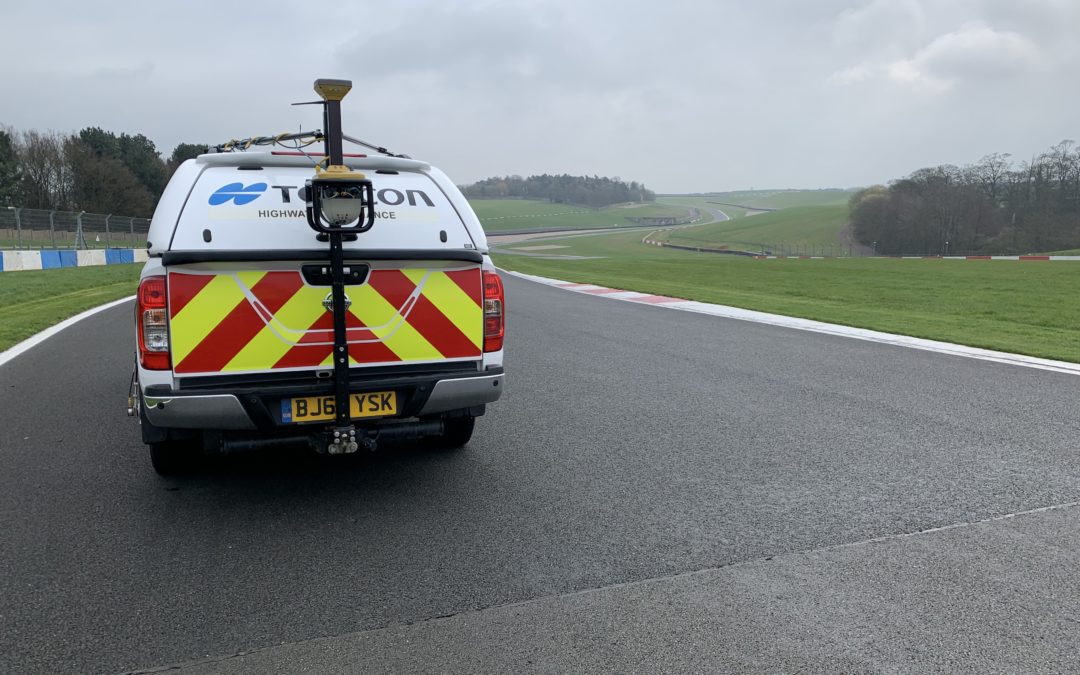Technology that can help accurately predict how much material is needed to be placed or removed from highways, airport or racetrack maintenance schemes, helping produce a more sustainable, durable and smoother surface, has been purchased by material testing specialists R3 Ltd.
The Topcon RD-M1 Scanner will help R3 Ltd with its specialist material testing work on road surfaces to enable its clients to have a more detailed understanding of the condition of the surface of the road before work such as resurfacing or other surface treatments go ahead.
It will also allow contractors to be more competitive when preparing tender, giving them detailed insights into the amount of material needed for a scheme in advance, making it more sustainable and contributing towards carbon savings.
The technology will also remove more operatives from working next to live traffic as it reduces the need for topographical surveys to be completed before works are planned and during asphalt construction.
Topcon’s RD-M1 Scanner collects continuous data via a driven survey that gives precise surface conditions using a combination of paving automation and 3D data collecting technology which can be then used to create a detailed design.
The scanner works seamlessly with an integrated HiPer SR GNSS receiver and Inertial Measurement Unit (IMU) to accurately capture point data while driving at normal speeds.
The RD-M1 is added to an already impressive portfolio of data capturing equipment that R3 Ltd has at its disposal. It will help the company offer the most professional of surveys, reports, milling and paving designs.
Data and the design can then be linked to Topcon’s 3D-MC Milling system using a 3D design model which automates the milling machines to the accurate milling depth on the design prepared from the scanner data. The system works from accurate Topcon Millimetre GPS technology and a 3D design, leading the milling crew to very accurate results. The system offers millimetre-level accuracy, a 2400 and 40 metre horizontal and vertical working range.
“As we move towards a future where sustainable road projects are becoming the norm, this new technology will help to give contractors the opportunity to save on material used in projects generated using the accurate data to create detailed designs that will produce smoother more durable and longer lasting surfaces,” said Campbell Waddell, Managing Director of R3 Ltd. “The scanner will allow us capture, monitor and analyse data for our customers roads, racetracks and runways around the world as part of our mission to use specialist testing to improve the condition of surfaces. The potential for this data is massive and we have only just scratched the surface of what is possible with this LiDAR scanner and the powerful Topcon software.”
R3 Ltd has recently been testing the scanner at the Knockhill racing circuit and it will also be used on a forthcoming resurfacing project working with Colas at Cork Airport.
Joshua Marshall, Business Development Manager at Topcon Positioning GB added: “It has been a pleasure to work with R3 in their venture to assist the road construction industry with the latest technology from Topcon. Both Topcon and R3 will be working together in the market to assist our customers achieve the best outcome whilst improving their environmental impact, efficiency and profit.”
This system will complement R3’s Road Test Machine (RTM) and other specialist service offerings.
Located at Ulster University, the RTM can quickly predict the performance of road material products in the laboratory to help the supply chain mitigate against the risks associated with road trials.
Road trials typically last up to two years during which they are monitored, and a certificate of compliance or non-compliance is then issued to the manufacturer. Although they are extremely important for ensuring products fit-for-purpose are installed on road networks, they can be expensive and time consuming. A manufacturer may have to wait up to two years and incur significant costs before realising that their product cannot be put on the market for certain applications.
The main driver behind product certification assessments in the UK and Europe is the Construction Products Regulations (CPR) implemented in 2013. The CPR allows a manufacturer to give a declaration of performance for a product based on conformity assessments which results in the product receiving a CE marking.
R3 can now help contractors and material producers with material development from the development stage through construction of a road trial site to condition monitoring of the material offering a built record and full analysis of the material surface condition.


Recent Comments